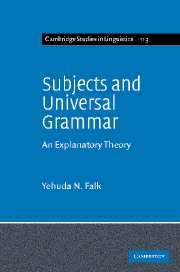7 - Competing theories
Published online by Cambridge University Press: 22 September 2009
Summary
Other approaches
The issues we have examined in this study have been discussed in a wide range of theoretical frameworks, with varying conclusions. In some respects, most of these analyses share a certain family resemblance to each other and to the proposals made here. This is not surprising; all typologically aware analyses of subjecthood work with the same phenomena. Given the properties of mixed-subject languages, the conclusion that subject needs to be factored into two distinct grammatical functions, as we have done here, seems inescapable.
Nevertheless, our analysis differs from the others, if not in its basic outline, in the implementation and the conceptualization of grammatical functions. We believe that, while other approaches may (or may not) describe subjecthood as well as the theory proposed here, none of them can explain subjecthood as well.
The advantages of our approach begin with the underlying assumptions we have made. The theory proposed here is based on a formal theory embodying a multidimensional architecture in which constituent structure, grammatical functions, and argument structure are distinct parallel levels of representation. This kind of theoretical architecture has allowed us to seriously consider questions of function within a formal syntactic system, rather than dealing only with formal structure or only with function. We have taken the functionality of elements within the formal syntactic system to be the crucial element in understanding the behavior of and piv.
- Type
- Chapter
- Information
- Subjects and Universal GrammarAn Explanatory Theory, pp. 197 - 221Publisher: Cambridge University PressPrint publication year: 2006



